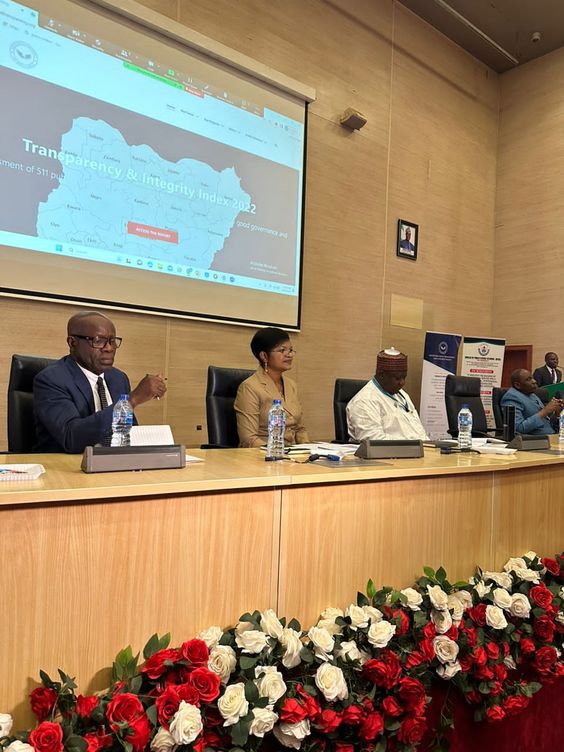Nigeria
The tenets of democracy and good governance are transparency, accountability, and access to information. – SGF

Transparency, accountability, and access to information have been cited as the three main tenets of democracy and sound government by the Secretary to the Federal Government, George Akume.
According to Akume, having access to information enables citizens to actively participate in the political process, have educated discussions, and hold their elected officials responsible.
According to the SGF, this is the reason the Federal Government ratified the Open Government Partnership, or OGP, to advance the theme of Access to Information, which attempts to enable citizens to hold government responsible through the disclosure of public information.
The SGF delivered a keynote address at the unveiling of the 2023 Transparency and Integrity Index Assessment for Federal/States Ministries, Departments, and Agencies, which was co-hosted by the Bureau of Public Service Reforms (BPSR) and the Centre for Fiscal Transparency and Integrity Watch (CeFTIW), with the theme “Proactive Disclosure, Access to Information, and Fight Against Corruption in Nigeria.”
Akume further pointed out the value of proactive information disclosure since it enables the prompt dissemination of accurate information.
He stated that by proactively disseminating information, government organisations could make sure that decisions were based on the most current and correct data, resulting in more informed and efficient policies.
“It is important to note that proactive disclosure of information as contained in the Freedom of Information Act aims to enable public institutions to adopt a proactive approach in revealing information to the public.
Transparency, accountability, and access to information have been cited as the three main pillars of democracy and sound government by the Secretary to the Federal Government, George Akume.
According to Akume, having access to information enables citizens to actively participate in the political process, have educated discussions, and hold their elected officials responsible.
According to the SGF, this is the reason the Federal Government ratified the Open Government Partnership, or OGP, to advance the theme of Access to Information, which attempts to enable citizens to hold government responsible through the disclosure of public information.
The SGF delivered a keynote address at the unveiling of the 2023 Transparency and Integrity Index Assessment for Federal/States Ministries, Departments, and Agencies, which was co-hosted by the Bureau of Public Service Reforms (BPSR) and the Centre for Fiscal Transparency and Integrity Watch (CeFTIW), with the theme “Proactive Disclosure, Access to Information, and Fight Against Corruption in Nigeria.”
Akume further pointed out the value of proactive information disclosure since it enables the prompt dissemination of accurate information.
He stated that by proactively disseminating information, government organisations could make sure that decisions were based on the most current and correct data, resulting in more informed and efficient policies.
“It is important to note that proactive disclosure of information as contained in the Freedom of Information Act aims to enable public institutions to adopt a proactive approach in revealing information to the public.
While the Access to Information Act is a potent weapon that gives citizens the ability to request and access information held by the government. These technologies are necessary to support good governance since it improves transparency and accountability.
“Proactive disclosure enhances public confidence in the administration. When information is easily accessible without the need for official requests, it makes it very evident that the government has nothing to conceal, according to him.
The Centre for Fiscal Transparency and Integrity Watch was founded to promote good governance by bolstering systems and mechanisms that enhance transparency and accountability of public institutions at the national and sub-national levels, according to Angela Nworgu, Chairman of the Board of Trustees, BoT, Centre for Fiscal Transparency and Integrity Watch.
Nworgu mentioned that the Centre works with partners in the government, media, and civil society to develop and carry out programmes and initiatives in data science, fiscal transparency, public sector integrity, and organised crime prevention.
She said the Centre launched the Transparency and Integrity Index in 2021 as an annual evaluation of public institutions’ adherence to national laws and international norms that encourage transparency and accountability to reduce corruption.
Nworgu continued by saying that the Index was created to reinforce already-existing legal frameworks for budgetary transparency, institutional competence regarding these frameworks’ requirements, and—most importantly—to create an informed populace that holds the government responsible.
She declared: “Today, we are releasing the third edition of the Transparency and honesty Index as part of our continued commitment to maintaining this project and defending the principles of honesty inside public institutions.
“We assessed public institutions, states, and local governments in these particular sectors and presented a thorough report on how transparent and accountable they are with accordance to the principles of proactive disclosure.
“The Transparency and Integrity Index 2023 is the result of extensive research, data analysis, and cooperation with independent validators. It demonstrates how committed we all are to the principles of openness, responsibility, and sound governance.
Given the concern about preventing corruption on the continent, “we strongly believe that mainstreaming the TII as a tool for measuring public sector compliance with laws on open governance, transparency, and accountability will go along way in the fight against corruption.”
The Transparency and Integrity Index evaluation, according to Dasuki Arabi, Director-General of the Bureau of Public Service Reforms, aims to promote programmes aimed at fostering accountability and transparency among all of the government’s ministries, departments, and agencies, or MDAs.
In the context of governance, transparency, according to Arabi, is of the utmost importance. He described it as a catalyst and a driving force for encouraging openness, accountability, and good governance in the nation.
In light of the country’s evolving score on the corruption index, he came to the conclusion that the path towards good governance has grown more persuasive.
